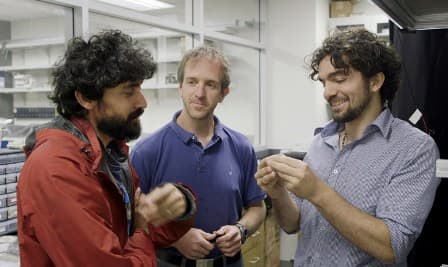Indian-born Professor Develops Computer Out Of Tiny Water Droplets
Born in Meerut, India - now an assistant professor of Bioengineering at Stanford University, Prof. Manu Prakash made news last year by astonishing the world with his brainchild - a <a href="https://www.crazyengineers.com/threads/foldscope-a-paper-microscope-that-costs-1-and-offers-2-000x-magnification.73868">Foldscope: A Paper Microscope That Costs <$1 And Offers 2,000X Magnification</a>. This time he is in limelight because of his new creation - a water based computer. Every digital device, be it a smartphone, a DVR or an airplane, works on a clock. Prof. Prakash explains that the water based system has been deployed only in the clock of the computer as it is the basis of it. It is same as the soldiers marching in a parade. If one of them falls, the file won't last long. In the same way, the computer processes need to synchronised and it is done with the help of a clock.

Prof. Prakash along with his two students devised a system with the help of tiny water droplets that could work as a computer clock. For this, water droplets are initially trapped in a magnetic field. When these droplets are applied to a flipped magnetic field, they form a precise motion in a fixed direction. The study has been described in a research paper published in Nature Physics. It presents a working flip-flop using the technology described.
The team says that system can be made smaller by controlling millions of droplets with the help of magnetic field. The tiny droplets in the system are almost the size of poppy seeds and thus very tiny comparison to current chips that are half the size of postage stamps. The aim of the team is to make the droplets much smaller that can do more number of operations on a single chip.
According to Manu Prakash, this new kind of computer founds its application in biology and chemistry by converting the computer into a high-throughput laboratory. Instead of performing experiments in bulk test tubes, each droplet can be used carry chemicals and be its own test tube and then droplet computer could be used to offer unprecedented control over these interactions.
How do you find this new creation by Manu Prakash? Share your thoughts with us in the comments' section below.
Source: #-Link-Snipped-#

The team says that system can be made smaller by controlling millions of droplets with the help of magnetic field. The tiny droplets in the system are almost the size of poppy seeds and thus very tiny comparison to current chips that are half the size of postage stamps. The aim of the team is to make the droplets much smaller that can do more number of operations on a single chip.
According to Manu Prakash, this new kind of computer founds its application in biology and chemistry by converting the computer into a high-throughput laboratory. Instead of performing experiments in bulk test tubes, each droplet can be used carry chemicals and be its own test tube and then droplet computer could be used to offer unprecedented control over these interactions.
How do you find this new creation by Manu Prakash? Share your thoughts with us in the comments' section below.
Source: #-Link-Snipped-#
0
